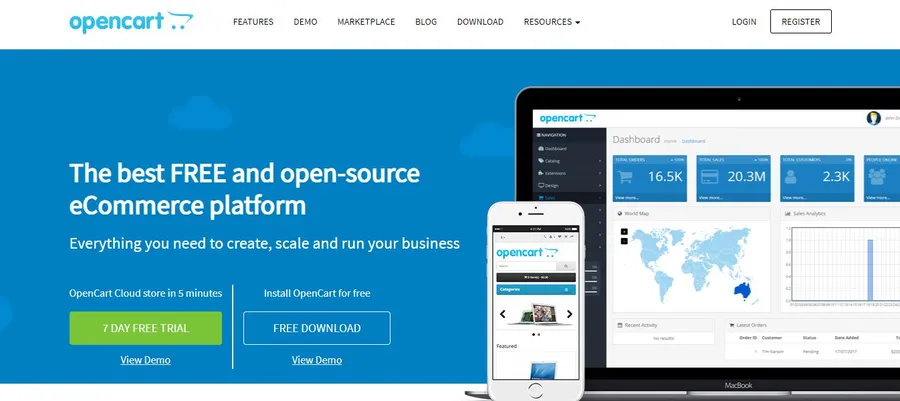Magento is a powerful and popular eCommerce platform, but it can be complex and expensive for small businesses. If you’re looking for a more user-friendly or affordable alternative, there are many great options available.
In this guide, we’ll discuss some of the best Magento alternatives, including both open-source platforms and website builders. We’ll compare their features, pricing, and ease of use to help you find the right platform for your needs.
Open Source eCommerce Platforms
Open source eCommerce platforms are free to use, but they require some technical knowledge to set up and maintain. They offer a high degree of flexibility and customization, but they can also be time-consuming and challenging to manage.
Let’s check out some of the most popular open-source eCommerce platforms for the best Magento alternatives
WooCommerce – Best Magento Alternatives

WooCommerce is one of the best Magento alternatives. It’s a popular plugin for WordPress that turns your website into an online store. It’s easy to use and has a wide range of extensions and themes available. However, it can be slow and resource-intensive, and it requires you to have a WordPress website already set up.
Good for: Experienced users, bloggers, and those who want a large community and plugin ecosystem.
Pros:
- Large and helpful community of WordPress developers.
- Free to install.
- Huge selection of plugins for customization.
- Integrates seamlessly with WordPress blogging features.
Cons:
- Not the easiest to use for beginners and may require developer help.
- No dedicated customer support.
- Requires additional costs for hosting, security, and themes.
- Built-in features are limited, relying heavily on plugins.
Pricing:
- Free plugin, but requires additional costs for hosting, security, themes, and plugins (starting from $35/year).
PrestaShop – Best Magento Alternatives

PrestaShop is among the Magento competitors. It’s a free platform that helps you build an online store. It’s known for being easy to use, even for beginners.
Good for: Beginners who want fast loading speeds and easy setup, but can afford expensive support.
Pros:
- User-friendly interface with a helpful onboarding demo.
- Faster page-loading speeds compared to Magento.
- Large selection of modules for additional functionality.
- Offers partnerships with web design and marketing agencies.
Cons:
- Expensive dedicated customer support plans.
- Upgrading to newer versions can be expensive.
- Fewer modules compared to WooCommerce.
- Limited built-in features compared to other platforms.
Pricing:
- Free to install but requires additional costs for hosting, security, themes, and modules (starting from $65 per theme and $30 – $50 per module). Dedicated support plans start at $250 per month.
OpenCart – Best Magento Alternatives

OpenCart is a free and open-source eCommerce platform. It’s considered one of the best Magento alternatives and is popular for its simplicity and ease of use. However, it has a limited range of features and can be difficult to customize.
Good for: Migrating from Magento, those who need multi-language features, and those who are comfortable with coding.
Pros:
- Easy migration from Magento is due to a similar code structure.
- Multi-language and currency options are built-in.
- Over 13,000 apps are available for additional features.
- Highly customizable if you know how to code.
Cons:
- Hidden costs for dedicated support, domain, and security.
- Dated theme designs compared to other platforms.
- Apps can be expensive, especially advanced ones.
Pricing:
- Free to install, but requires additional costs for hosting, security, domain, and dedicated support ($99/year or $99 per fix). Apps cost extra.
Zen Cart – Best Magento Alternatives

Zen Cart is one of the alternatives to Magento that has been around for many years. It is a mature platform with a wide range of features, but it can be complex to use and may not be the best choice for beginners.
Good for: Absolute beginners on a tight budget, but be prepared for an outdated interface and limited features.
Pros:
- Completely free to use, including customer support (through a community forum).
- Drag-and-drop page editor for easy storefront design.
- Built-in SEO tools for product descriptions and metadata.
- Highly customizable with coding knowledge.
Cons:
- Outdated user interface and backend.
- No dedicated customer support and relying on a community forum.
- Limited built-in features compared to other platforms.
- No trial is available, you need to download and build a store to test it.
Pricing:
- Free platform, but requires additional costs for hosting, security, and domain.
Website Builders
Website builders are a great option for businesses that want to create an online store without having to learn any coding. They are easy to use and often have drag-and-drop interfaces that make it simple to create a professional-looking store. However, they typically charge monthly fees and may have limitations on features and customization.
Let’s check out some of the most popular website builders for eCommerce for the best Magento alternatives
Shopify – Best Magento Alternatives

Shopify is the most popular website builder for eCommerce that you can use as one of the best Magento alternatives. It has a wide range of features, a large app store, and excellent customer support. However, it also has the highest fees of any of the website builders on this list.
Good for: All-around eCommerce platform, beginners
Pros:
- Easy to use, and no coding is required.
- Powerful sales features and abandoned cart recovery.
- Multi-channel selling across various platforms.
- Large app market for additional functionality.
Cons:
- Imposes transaction fees (unless using Shopify Payments).
- App costs can add up quickly.
- Limited customization compared to open-source platforms.
Pricing:
- Free 90-day trial, then paid plans starting from $5/month.
Wix – Best Magento Alternatives

Wix is among the Magento competitors. It’s a popular website builder that is known for its ease of use. It has a drag-and-drop interface that makes it easy to create a store, even if you have no prior experience. However, Wix has fewer features than Shopify and may not be suitable for businesses with complex needs.
Good for: Small shops, creative freedom
Pros:
- Extremely user-friendly with intuitive design tools.
- Affordable pricing with good value for money.
- Beautiful pre-designed templates.
- Many features built-in.
Cons:
- Limited scalability for larger businesses.
- No app store for additional functionality.
- Stock management system lacks advanced features.
Pricing:
- Free plan for building a store, paid plans starting from $27/month to accept online payments.
BigCommerce – Best Magento Alternatives

BigCommerce is another Magento alternative that is designed for businesses that sell a lot of products or want to sell internationally. It has a wide range of features and is scalable to meet the needs of growing businesses. However, BigCommerce also has higher fees than some of the other website builders on this list.
Good for: Large businesses, scalability
Pros:
- Excellent for large businesses with ambitious growth plans.
- Many built-in features, no need for many apps.
- Zero transaction fees and support for over 100 currencies.
- Powerful SEO and analytics tools.
Cons:
- More complex interface compared to other platforms.
- Can be expensive for smaller businesses.
- Not as beginner-friendly as Shopify or Wix.
Pricing:
- Free 14-day trial, then paid plans starting from $29.95/month.
Squarespace – Best Magento Alternatives

Squarespace is one of the alternatives to Magento. It is known for its beautiful templates and its focus on design. It is a good option for businesses that want to create a visually appealing store. However, Squarespace has fewer eCommerce features than some of the other website builders on this list.
Good for: Design-focused businesses, beautiful templates.
Pros:
- Stunning and modern website designs.
- High-quality built-in features, including inventory management.
- Easy to use with a drag-and-drop interface.
- Good value for money.
Cons:
- Limited app store for additional functionality.
- Not as scalable as other platforms.
- Advanced design tools may have a learning curve.
Pricing:
- 14-day free trial, then paid plans starting from $36/month for eCommerce functionality.
Which Are The Best Magento Alternatives?
The best eCommerce platform for you will depend on your specific needs and budget. If you are a small business with a limited budget, a website builder like Wix or Squarespace may be a good option. If you need more features and flexibility, an open-source platform like WooCommerce or PrestaShop may be a better choice. And if you have a large business with complex needs, you may want to consider a platform like Shopify or BigCommerce.
Read More: What is a Point of Sale (POS)? 10+ Best Magento POS Systems
Contact US | ThimPress:
Website: https://thimpress.com/
Fanpage: https://www.facebook.com/ThimPress
YouTube: https://www.youtube.com/c/ThimPressDesign
Twitter (X): https://x.com/thimpress_com
